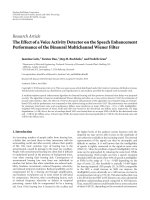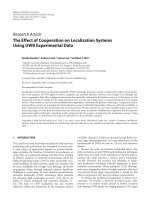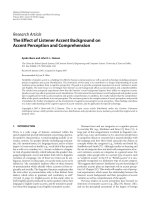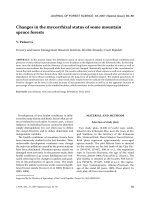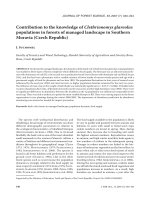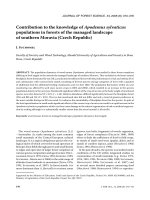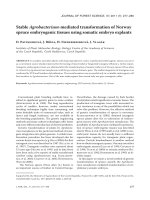Báo cáo lâm nghiệp: "experiment on the effect of girdling and gibberellin application on flowering induction of 12 yr old seedlings of Douglas fir and Norway spruce" pptx
Bạn đang xem bản rút gọn của tài liệu. Xem và tải ngay bản đầy đủ của tài liệu tại đây (173.38 KB, 4 trang )
Field
experiment
on
the
effect of
girdling
and
gibberellin
application
on
flowering
induction
of
12
yr
old
seedlings
of
Douglas
fir
and
Norway
spruce
M.
Bonnet-Masimbert
with
the
technical
assistance
o
with
the
technical
assistance
of
G.
Chanteloup,
P.
Delanzy
and
J.
Coupaye
INRA,
Station
damdlioration
des
Arbres
Forestiers,
Ardon,
45160
Olivet,
France
I
1
!
-
-I I
Introduction
Climate
has
a
strong
influence
on
flow-
ering
of
trees
and,
for
field
experiments,
it
is
difficult
to
control
environmental
condi-
tions.
Thus,
many
experiments
on
flow-
ering
induction
in
conifers
are
performed
on
potted
trees,
which
are
at
least
partly
maintained
under
greenhouse
conditions.
The
benefits
of
establishing
indoor
orchards
instead
of
classical
soil-based
ones
have
been
proposed.
However,
hundreds
of
hectares
of
soil-based
seed
orchards
have
been
established
and
must
be
managed
for
a
more
abundant
and
regular
flowering.
Also,
besides
clonal
orchards
(generally
grafted),
some
seed-
ling
seed
orchards
have
been
established
which,
for
an
equivalent
size,
are
less
mature
than
grafts.
This
paper
deals
with
preliminary
field
experiments
on
Douglas
fir
(Pseudotsuga
menziesii)
and
Norway
spruce
(Picea
abies)
seedlings.
Materials
and
Methods
Two
experiments
using
combinations
of
bark
girdling
(G)
(double
semicircular
overlapping
5
mm
wide
girdles)
and
trunk
injections
of
gib-
berellins
(GA4/7)
were
tested
in
1986
on
12
yr
old
seedlings,
6-8
m
high,
raised
in
the
INRA
(Orl6ans)
nursery.
Douglas
fir
50
seedlings,
belonging
to
7 open-pollinated
families,
were
divided
among
4
treatments
applied
just
before
vegetative
bud
burst:
1)
control;
2)
girdling;
3)
girdling
+
50
mg
GA4/7
(45%
A7)
+
5
mg
naphthalene
acetic
acid
(NAA);
4)
girdling
+
100
mg
GA4/7
+
10
mg
NAA.
At
treatment
time,
each
tree
received
soil
fertilization
with
200
g
of
Ca(N0
3)2.
GA4/7
injections
were
made
in
300
pl
of
ethanol
in
the
xylem
of
the
1981
internode.
On
each
tree,
4
branches
on
both
the
1982
and
1984
whorls
were
selected
for
shoot
measurement
and
cone
counts.
Two
branches
were
plastic-bagged
(in
order
to
simulate
a
localized
’greenhouse
effect’)
for
2
wk
starting
3
wk
after
the
beginning
of
the
treatment.
Norway
spruce
30
seedlings,
belonging
to
6
open-pollinated
families,
were
divided
among
5
treatments.
Treatments
were
applied
when
about
50%
of
the
lateral
shoot
elongation
was
completed
and
consisted
of:
1)
girdling;
2)
girdling
+
2
x
50
mg
GA4/7
at
a
2
wk
interval
in
the
1983
internode;
3)
same
as
treatment
2
applied
in
the
1981
internode;
4)
girdling
+
one
application
of
100
mg
GA4/7
in
the
1983
internode;
5)
same
as
treatment
4
applied
in
the
1981
internode.
GA4/7
injections
were
made
in
300 pl
of
etha-
nol.
On
each
tree,
4
branches
(in
the
4
cardinal
directions)
on
both
1983
and
1984
whorls
were
selected
for
shoot
measurement
and
cone
counts,
2
of
them
were
plastic-bagged
for
4
wk,
starting
at
the
beginning
of
treatments.
The
length
of
the
terminal
and
2
subterminal
shoots
were
measured
in
the
fall
on
each
se-
lected
branch
and
their
total
number
of
male
and
female
cones
were
counted
the
following
spring
on
the
entire
branch.
Also,
the
total
num-
ber
of
female
cones
on
the
entire
tree
was
counted.
On
each
sampling
branch,
terminal
and
subterminal
shoot
elongation
and
number
of
male
and
female
cones
were
subjected
to
variance
analysis
(see
the
text
for
the
analyzed
factors)
and
Duncan’s
test.
The
family
effects
are
not
presented
here.
Results
and
Discussion
Douglas
fir
The
main
results
are
given
in
Table
I.
Gir-
dling
with
or
without
GA4/7
had
a
strong
significant
stimulatory
effect
on
both
male
and
female
flowering.
On
the
other
hand,
GA4/7
increased
the
length
of
both
terminal
and
subterminal
shoots.
The
higher
whorl
produced
significantly
more
female
cones
but,
curiously,
this
was
also
true
for
male
cones.
Bagging
the
shoot
slightly
reduced
terminal
elongation
but
had
no
effect
on
flowering.
Finally,
all
3
treatments
differed
significantly
from
the
control
for
the
mean
total
number
of
fe-
male
cones
per
tree.
Norway
spruce
The
main
results
are
summarized
in
Table
II.
All
the
trees
were
girdled,
but
treatment
1
alone
only
slightly
stimulated
flowering
compared
to
(aA
+
girdling
treatments.
Therefore
GA4/7
had
a
specific
and
signi-
ficant effect
on
both
male
(only
for
1
injec-
tion
of
100
mjj
GA4/7)
and
female
flow-
ering
(the
best
results
corresponding
to
2
injections
of
50
mg
GA4/7,
(treatments
2
and
3).
This
differential
sexual
response
may
be
related
to
differences
in
the
dif-
I u, 1&dquo;&dquo;;1,1,.<:&dquo;,, vdl&dquo;&dquo; ill i:d’ nUiil&dquo; followed
by
the same
letter
do
not s gnificantly
differ
at
5 % .
ferentiation
period
between
both
sexes.
Higher
branches
typically
bore
more
fe-
male
cones.
Differences
also
existed
in
the
proportion
of
shoot
elongation
com-
pleted
at
treatment
time
(60.3
and
79%
for
terminal
and
subterminal
shoots
of
the
lower
whorl
as
opposed
to
48.6
and
67%
for
the
higher
whorl,
respectively).
Even
if
female
flowering
of
Norway
spruce
was
generally
located
at
the
very
top
of
the
tree,
these
differences
in
elongation
might
also
be
related
to
a
stage
of
vegetative
development
in
the
higher
whorls
more
favorable
for
flowering
induction
(Bonnet-
Masimbert,
1987).
For
the
total
number
of
female
cones
per
tree
(Table
11)
there
is
no
significant
difference
between
the
4
GA4/7
treat-
ments.
In
contrast
to
the
observations
on
Douglas
fir,
GA4/7
often
reduced
the
shoot
elongation
in
spruce
significantly.
Plastic
bagging
caused
a
slight
but
signifi-
cant
reduction
in
the
elongation
of
the
ter-
minal
shoot.
It
had
no
significant
effect
on
male
or
female
flowering
or
elongation
of
subterminal
shoots.
Conclusion
It
is
possible
to
stimulate
the
flowering
of
seedlings
of
Norway
spruce
(mainly
fe-
male)
and
Douglas
fir
in
the
field
through
a
combination
of
girdling
and
GA4/7
treat-
ments.
GA4/7
is
confirmed
to
be
especial-
ly
necessary
for
Norway
spruce
(Bonnet-
Masimbert,
1987).
Certainly
these
positive
responses
were
partly
due
to
the
fact
that
1986
was
generally
favorable
to
natural
flowering
induction.
From
comparisons
between
the
last
5
yr,
we
suspect
that
high
sunshine
from
mid-June
to
the
beginning
of
July
may
have
a
positive
effect.
Kosin-
ski
and
Giertych
(1982)
clearly
demon-
strated
the
role
of
light
intensity
on
flow-
ering
of
Norway
spruce.
However,
growth
response
of
1986-girdled
Douglas
fir
in
1987
and
1988
was
reduced.
Further-
more,
bud-burst
was
delayed
for
1-2
wk
over
the
control,
indicating
a
durable
physiological
stress.
So,
contrary
to
the
results
of
Wheeler
et
aL,
(1985),
girdling
can
hardly
be
proposed
as
a
routine
treat-
ment
in
soil-based
seed
orchards.
References
Bonnet-Masimbert
M.
(1987)
Preliminary
results
on
gibberellin
induction
of
flowering
of
seedlings
and
cuttings
of
Norway
spruce
indicate
some
carry-over
effects.
For.
E!1.
Manage.
19,
163-
171
Kosinski
G.
&
Giertych
M.
(1982)
Light
condi-
tions
inside
developing
buds
affect
floral
induc-
tion.
Planta
155, 93-94
Wheeler
N.C.,
Masters
C.J.,
Cade
S.C.,
Ross
S.D.,
Keeley
J.W.
&
Hsin
L.Y
(1985)
Girdling:
an
effective
and
practical
treatment
for
en-
hancing
seed
yields
in
Douglas
fir
seed
orchards.
Can.
J.
For.
Res.
15,
505-510
0
